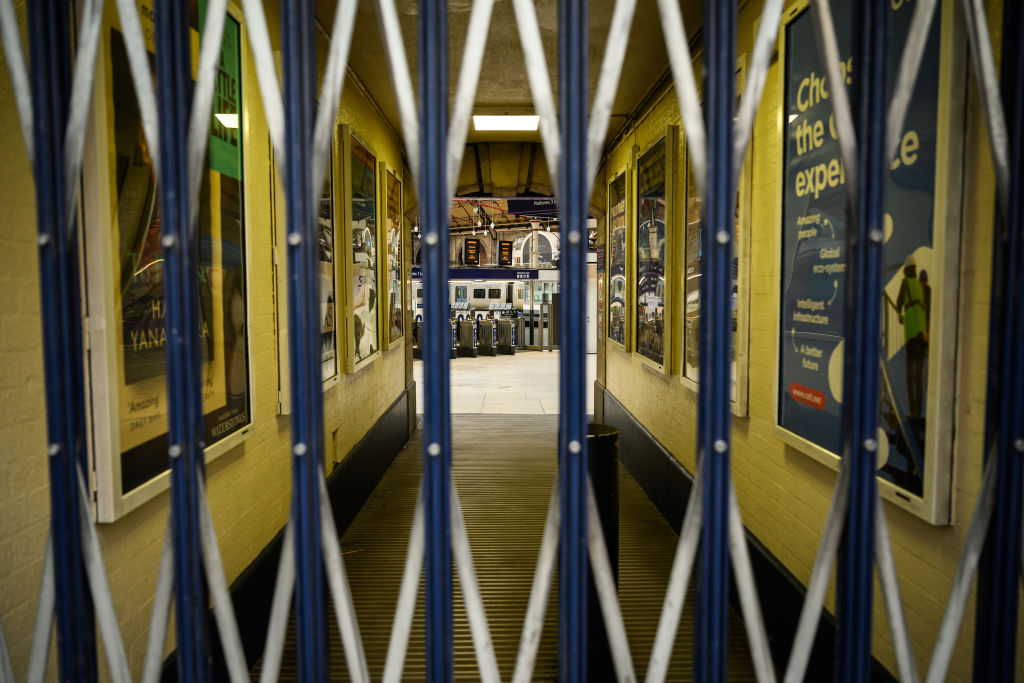Today is being dubbed ‘Walkout Wednesday’: thousands of schools are shut as teachers go on strike – and civil servants and lecturers are also on the picket line. Railway staff continue their strike today too and there is little sign of the strike deadlock being broken. We’re losing more working days to industrial action than at any point since the 1980s. A large chunk of industrial action is made up by rail strikes, and the government fears ‘a generation’ of passengers will be put off train travel for good. Might the strikes prove terminal for Britain’s railways?
The RMT, which is responsible for the latest walkout, is at the forefront of the action. The union is still holding out on a pay offer worth 5 per cent, then 4 per cent over the next two years. Aslef, which represents train drivers and is also staging a strike today, is seeking an inflation-busting pay rise. But if ministers do come to the table – they insist they won’t – and the disputes are resolved, will there be much of a railway left?
Britain’s railways have experienced years of decline. More than half of train services from the country's top 15 busiest stations were delayed or cancelled in 2021. If you’re turning up to a train station, it’s fair to assume something will go wrong – even without the strikes.
Some of this disruption is, of course, a knock-on effect from the pandemic. It’s taken a long time for the railways to get into gear since the days of lockdown. It wasn’t until November that rail passenger numbers returned to 99 per cent of their pre-Covid levels. More figures from the Office of Rail and Road show that, between July and September last year, there were a fifth less rail journeys than in the same period before the pandemic.
Brits travelled nearly 8.6 billion miles on the railway between July and September last year but that too was just 77 per cent of pre-pandemic levels. Rail use is slowly creeping up, though: it’s increased in five of the last six quarters. London’s new Elizabeth Line is already the most-used railway in the country only months after opening. So, there is demand for rail use. If the trains get going.
But more and more trains don’t even run. In the latest quarter of data, over 4 per cent of trains were cancelled – the highest proportion since records began in 2014. They’re arriving late more frequently as well: in the latest performance figures, every single operator’s punctuality score worsened except for the continually impressive Elizabeth Line. Modernisation works.
Even when passengers make it aboard, all too often they are unhappy with the journeys they pay ever increasing amounts for (fares have nearly doubled since 2004). Some 51 per cent of passengers who have complained to train operators do not think their complaint was handled properly. It’s been at that level for years. Things don’t seem to be improving.
Two things are clear then. Firstly, there’s demand for trains – after all, two thirds of journeys originate from London and people are presumably always going to travel in and out of the capital. But the service experienced by many is just not up to scratch, despite the billions of pounds poured in to keeping the railways running. Reform is clearly needed.
That’s something that unions are resisting though, over fears it will lead to job losses. But the unions perhaps don’t hold the power they once did. When the RMT's Mick Lynch started out, these organisations held a lot more sway. Now, union membership is dwindling: these organisations represent under seven million workers, having nearly halved from a peak of over 13 million in 1979. Union power is still strong on the railways though. Data from the ONS’s Labour Force Survey shows that around 70 per cent of rail workers are union members, compared with just 23 per cent in the wider economy.
Another problem for the unions is the diminishing effect strikes have. For many, working from home has become the norm post-lockdown and so it’s much easier to avoid strike disruption if you can’t get into the office. While office-based firms might not be as affected then, those who have felt the pain are hospitality and retail businesses. As Christmas parties and family meet-ups were cancelled over the festive period, UK hospitality, the body representing pubs, bars, restaurants and hotels, estimated that the strikes have cost the industry £1.5 billion in lost earnings in December alone. Before the strikes they’d thought it would take two months to rack up losses of that scale. This is terrible news for a sector under pressure: many of these businesses rely on festive earnings to see them through the traditionally quiet first quarter of the year.
When train travel works – runs on time, no one sits in your reserved seat and a packet of mini cheddars and a small merlot are delivered to your carriage – there’s no finer way to get around. But Britain's railways are increasingly unreliable, and these strikes only exacerbate that. We can all sympathise with workers who want a pay rise – even well-paid train drivers – but surely reform must be part of the picture too.







Comments